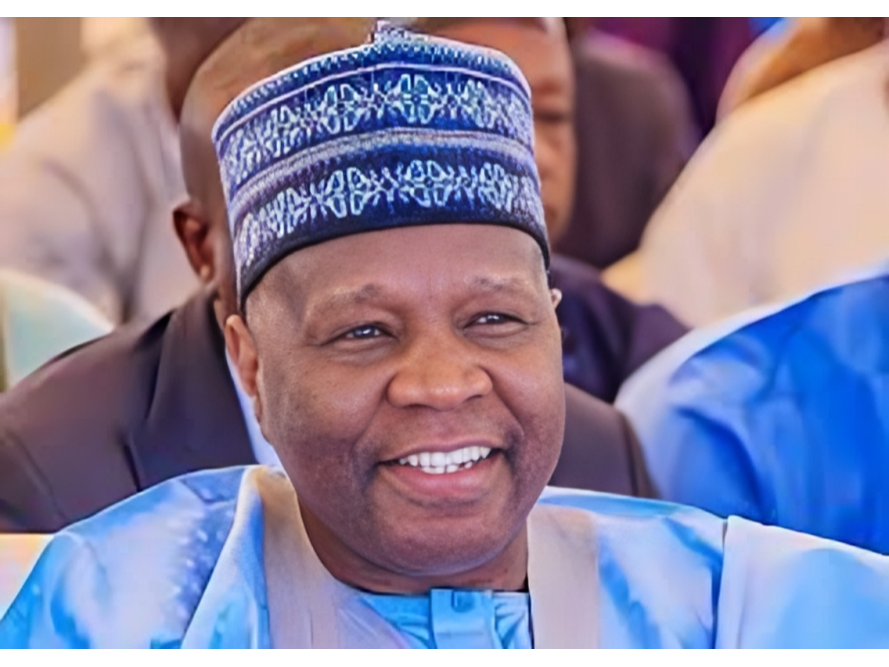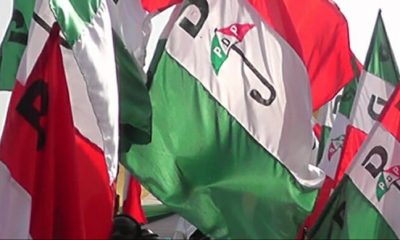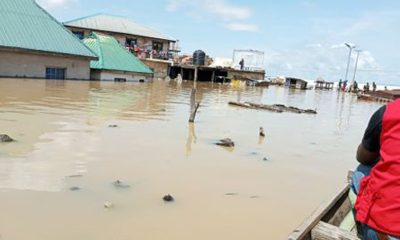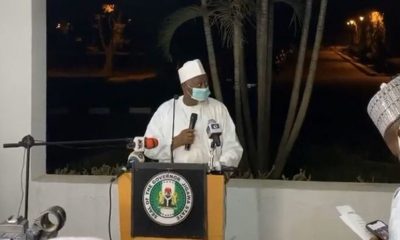Uncategorized
Abuja Peace Institute Facilitated N/Delta Amnesty: Bakut

The Abuja-based Institute for Peace and Conflict Resolution (IPCR) facilitated the Niger Delta Amnesty Programme that ended persistent agitations by militants in the Niger Delta.
The Director-General of the institute, Dr Bakut Bakut, made the announcement while speaking in Abuja on Sunday.
He said the Federal Government had commissioned the institute to broker peace between the government and the militants, to end the Niger Delta conflict over a decade ago.
The fighters, popularly known as Niger Delta militants were fighting to have greater share of resources in the resource-rich Niger Delta in a bitter war that took hundreds of lives.
The militants had taken up arms against their country, destroying oil infrastructure, kidnapping oil workers and making life unbearable for residents of the Niger Delta, including seafarers in the Gulf of Guinea.
“Most Nigerians know that there was amnesty for Niger Delta militants but nobody will tell you that this institute is actually responsible for the idea of amnesty.
“In this same institute, we had some of the Niger Delta leaders — people like Ateke Tom and others.
“They actually came to this institute. We had negotiations with them and we were able to arrive at what has today become the amnesty programme.’’
On Aug. 6, 2009, former President Umaru Yar’Adua announced an amnesty deal for militants, making the fighters to bid farewell to arms and ending a low-level war that had cost Nigeria a third of its oil production.
Bakut said the significant role the institute had been playing in Nigeria had not been known fully or appreciated completely by Nigerians since the institute was established 21 years ago.
“Within this period of 21 years, the institute has done a lot of analyses and researches as well as interventions, capacity building and policy advice to government.
“We have done a lot of work with regard to the Niger Delta issue.
The director-general noted that the institute had also facilitated and ensured that the right to vote of Internally Displaced Persons (IDPs) in Nigeria’s war-ravaged Northeast was not lost as the IDPs were able to cast their votes in the 2015 general elections.
Bakut disclosed that the task of making it possible for the IDPs to vote was the outcome of the collaboration of the institute with the Independent National Electoral Commission (INEC).
“Also, on the issue of Boko Haram in 2015, there was the problem of whether the IDPs would be allowed to participate in the elections.
“Again, it was the IPCR that had to go to INEC to present a position paper to them and say this is what has to be done.
“The institute was thereafter, able to persuade INEC to get IDPs to vote in 2015.
“In the area of the armed forces absorbing the civilian Joint Task Force (JTF), again it was the institute that made it possible- in furtherance of our policy.
“After Boko Haram what Next’’ – that suggested that rather than letting the JTF go, they should be given the opportunity to join the armed forces so that they would not become our problem later.”
Bakut said that the IPCR had been doing a lot toward ensuring that banditry and killing of farmers by herdsmen were stamped out in the country. (NAN)
NEWS
Ododo Clears N98.8 Billion Debt, Tasks Officials On Grassroots Engagement, Local Patronage

From Joseph Amedu, Lokoja
Governor Ahmed Usman Ododo has charged government officials to remain close to the grassroots and ensure constant engagement with the people, noting that such connection is key to responsive governance. Ododo gave the charge during the State Executive Council Meeting held in Lokoja on Monday.
“We are in government to serve the people, and that means staying connected to their needs and aspirations,” the Governor said. As part of efforts to boost the local economy, the Governor also directed all government officials to wear Made-in-Kogi fabrics as a show of support for indigenous industries. He encouraged Kogites to take pride in local products and lead a cultural and economic renaissance from within. Also Briefing journalists after the meeting, the Commissioner for Information and Communications, Hon. Kingsley Femi Fanwo, said the administration is committed to making governance more visible and impactful. “Governor Ododo is driving a government that listens, learns, and leads from the grassroots. His directive on Made-in-Kogi fabrics is a strategic move to grow our economy and export our identity,” Fanwo said. On infrastructure, Fanwo disclosed that perimeter fencing at the Confluence University of Science and Technology (CUSTECH), Osara is 90% completed, while both male and female hostels have been completed and are already housing students. Similar projects at the Kogi State University, Kabba, are progressing satisfactorily. To improve public safety, the Council also approved a bill to restrict the movement of heavy trucks during peak hours. Another bill was approved for the establishment of the Kogi State Agency for Climate Change as part of a forward-thinking response to global environmental challenges. In a separate briefing, the Commissioner for Finance, Budget and Economic Planning, Mukadam Asiwaju Asiru Idris, announced that the Ododo administration has fully liquidated N98.8 billion in debts inherited from previous administrations within just 15 months. The breakdown includes,N8 billion in bonds from the Idris Wada administration,N50.8 billion salary bailout from the last administration,N10 billion ECA-backed infrastructure loan,N15 billion infrastructure loans from Zenith Bank and another N15 billion from UBA Plc.“This is a landmark achievement. His Excellency Governor Ododo has demonstrated fiscal discipline and commitment to economic recovery. Within 15 months, we have cleared N98.8 billion in inherited debt,” Idris said.He added that Fitch Ratings has upgraded Kogi State’s credit rating from ‘B-’ to ‘B’, with a stable outlook, citing prudent financial management. As of September 30, 2024, the state’s debt profile stands at N40.5 billion, placing it on a strong path to debt sustainability.Uncategorized
France to Partially Ban Smoking in Public Areas to Protect Children

France is to ban smoking in public outdoor spaces, including beaches, parks, school zones, bus stops and sports facilities starting July 1 as part of a nationwide effort to protect children.
Health Minister Catherine Vautrin said where there are children, tobacco must disappear.
She added that plans to lower the nicotine content in vaping products and reduce the number of flavours available.
“Anyone who violates the new smoking ban will have to pay a fine of 135 euros (153 U.
S. dollars).“The regulation is to be monitored by the municipal police.
“My goal is both simple and deeply ambitious: to ensure that children born in 2025 become the first smoke-free generation,” the minister said.
The new nationwide smoking restrictions, many of which were already in place at the local level, are designed to support that vision, she said.
However, outdoor seating at cafés and the use of e-cigarettes is exempted from the ban, but young people should no longer smoke outside schools.
The minister said that the size of the area around schools where smoking would no longer be permitted in future was still being determined.
The regulation should also prevent pupils from going outside the building to smoke.
In 2023, 15.6 per cent of 17-year-olds said they smoked, compared to twice as many 10 years earlier.
Smoking remains the leading preventable cause of death in France, responsible for 75,000 deaths annually or more than 200 per day, the health minister added.
Vautrin noted that it has been proven that prevention reduces the risk.
She also noted the economic toll, with cancer costing the country 150 billion euros per year.
Vautrin emphasised that the right to smoke is not being abolished.
“People are free to smoke at home or in designated areas. But that freedom ends where a child’s right to clean air begins.” (dpa/NAN)
Uncategorized
Tinubu Repositioning Nigeria for Sustainable Growth – Gov. Yahaya

Gov. Yahaya of Gombe State has lauded President Bola Tinubu for the implementation of viable social and economic reforms geared towards repositioning Nigeria for sustainable development.
The governor felicitated with the President and his deputy, Vice President Kashim Shettima on the occasion of their second anniversary in office.
Yahaya, in a goodwill message by his media aide, Mr Ismaila Uba-Misilli, said Tinubu’s bold reforms would reposition Nigeria on the path of sustainable growth.
He described Tinubu’s two years in office as those of courage, bold reforms, and purposeful governance under its Renewed Hope Agenda.
“President Tinubu has taken decisive steps to reposition Nigeria on the path of sustainable growth,” he said.
Yahaya said that Tinubu had initiated viable infrastructure development projects such as the Lagos – Calabar Coastal Highway and the Sokoto-Badagry Road, as landmark efforts to bridge developmental gaps and stimulate the economy.
According to Yahaya, these projects, along with other strategic interventions in energy, agriculture, transportation, and the digital economy, are gradually laying the foundation for a more prosperous and resilient Nigeria.
He acknowledged Tinubu administration’s renewed drive to tackle security challenges, describing the intensified campaign against insurgency, banditry and criminality as “commendable.”
Yahaya, who is also the Chairman, Northern Governors’ Forum (NGF), also applauded the president’s inclusive and consultative leadership style, fostering national unity and renewed confidence in governance.
“The Northern region is already feeling the ripple effects of Tinubu’s policies through the improved Federal Government collaborations, increased access to social investments, and targeted empowerment programmes for youths, women and vulnerable groups.”
He further prayed for continued divine guidance, good health and greater wisdom for Tinubu as he steers the nation toward peace, equity and development. (NAN)




























